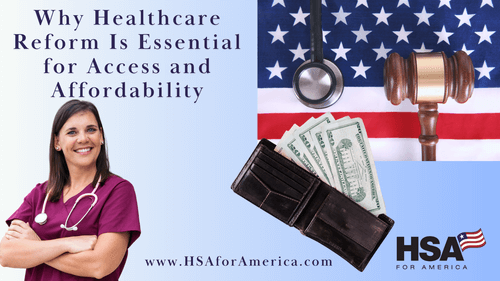Healthcare reform is crucial to making medical care more affordable and accessible for all Americans.

People shouldn’t be taxed on money they need to spend on medical care. But that’s exactly what we’re doing, under the current tax code.
Yes, health insurance premiums themselves are generally deductible or non-taxable to employees. But those are far from the only expenses people with medical conditions face. People who are sick and injured still incur thousands in out-of-pocket costs for everything from deductibles to copays to coinsurance to prescription drug travel costs.
The fact is, that people with significant out-of-pocket healthcare costs are treated unfairly under the current tax regimen.
According to a Johns Hopkins University study, even people with employer-sponsored health plans paid an average of $5,492 in out-of-pocket costs for a new cancer diagnosis. In many cases, most of those dollars paid are fully taxable to the individual. That is, they receive no tax deduction for those extra out-of-pocket costs
People with health problems have enough on their plate. They shouldn’t have to pay taxes on their out-of-pocket costs on top of that.
That’s just one of numerous unfair provisions in the tax code that restricts access to needed medical care and stifles innovation, competition, and consumer choice.
Compare Pricing on the Best Insurance Plans Available
How Healthcare Reform Can Improve Access and Affordability
Make Medical Costs an Above-the-Line Deduction
Current tax rules limit medical deductions to expenses exceeding 7.5% of income.
But they’re only available to households that itemize their deductions. They are completely useless to people who file a 1040 EZ. And even for households that do itemize, many families will never meet this 7.5% of income threshold.
For example, a household with two people each earning $60,000 per year that has a new cancer diagnosis that costs them $5,492 in out-of-pocket costs would receive no tax break at all––whether they itemized or not.
Making the deduction an above-the-line one would make medical care more accessible and affordable. It would encourage people to seek necessary care without fear of financial strain. And it would benefit middle-class families most. Middle-class often earn too much for Medicaid or Affordable Care Act subsidies, but too little to absorb big medical bills.
Treat Health Sharing Plans Fairly
Health sharing contributions should be tax-deductible for individuals, just like health insurance premiums –– and for precisely the same reasons.
Health sharing plans are affordable, powerful non-insurance alternatives to traditional health insurance products. They provide great protection against catastrophic healthcare costs. And because most of them don’t restrict patients to narrow care networks of low-cost providers, they offer much greater freedom to choose medical providers.
This flexibility allows people to seek care that best fits their needs.
And they’re available at just around half the cost of an unsubsidized Affordable Care Act Marketplace health insurance plan. Which would save thousands of dollars per year for a married couple or family.
LEARN MORE: How Much Does Health Sharing Save Compared to Health Insurance?
Tax policy should encourage, not penalize, individuals who choose health sharing for their healthcare protection. But health sharing members aren’t fairly treated under the tax code: Currently, health insurance premiums are deductible (above the line!) while health sharing contributions are not.
Furthermore, the value of employer-sponsored health insurance plans is non-taxable to the employee, while employer-sponsored health sharing plans are fully taxable to workers – limiting their use.
This unequal treatment is unfair and outdated.
It’s also largely the result of massive lobbying and rent-seeking by powerful insurance industry special interest groups.
The fact is that now millions of Americans rely on health sharing plans for affordable and reliable medical cost coverage. These plans reduce strain on public programs and foster personal responsibility.
Treating health sharing contributions as tax-deductible – on an even keel with health insurance premiums, would level the playing field, reduce financial burdens, and respect individuals’ freedom to choose their own healthcare solution.
Expand Health Savings Accounts
Health Savings Accounts (HSAs) should be expanded to give more Americans control over their healthcare spending.
HSAs allow people to save pre-tax dollars to pay for qualified medical expenses. This money compounds in the HSA tax-free, and can then be used to help pay for deductibles and other out-of-pocket expenses tax-free.
They empower people to make cost-conscious healthcare decisions. They also provide a valuable safety net to protect against unexpected medical bills. Expanding HSAs would benefit millions, including those with chronic conditions or high out-of-pocket costs.
At a minimum, we should expand the maximum allowable HSA contribution to match the maximum allowable out-of-pocket costs under ACA-compliant health insurance policies.
Under current law, the max out-of-pocket cost for ACA policies is $9,200 for an individual and $18,400 for a family. But allowable HSA contributions are less than half that figure: $4,300 for individuals and $8,550 for a family. HSA contributions should be expanded to match these maximum out-of-pocket limits.
Critics argue that HSAs mainly benefit higher-income individuals who can afford to save. But our proposal to make all medical and dental expenses fully tax-deductible as an above-the-line tax deduction helps address this concern.
We could also means-test tax-advantaged contributions beyond the current limits. Or allow for non-deductible HSAs, just as we do for traditional IRAs for higher-income households.
We should also expand the number of health insurance plans that qualify for a health savings account – or remove the requirement altogether. This would allow millions more Americans access to health savings accounts, and further remove barriers to medical care.
Allow Retirees to Keep Contributing to HSAs
Health Savings Account (HSA) contributions should be allowed after age 65.
Currently, individuals lose the ability to contribute to an HSA once they enroll in Medicare. This restriction makes little sense, especially as healthcare costs typically increase with age. Allowing continued contributions would help seniors manage out-of-pocket expenses, including Medicare premiums, copays, and long-term care costs.
One common argument against this change is that Medicare already covers most healthcare needs.
But Medicare doesn’t cover everything. Not even close. Dental, vision, hearing, and many long-term care expenses remain significant out-of-pocket costs for seniors. HSAs provide a flexible way to save and pay for these services tax-free.
LEARN MORE: The Tax Treatment of Health Savings Accounts
We can even expand HSAs to allow seniors to take tax-free withdrawals to pay Medigap or Part D prescription drug plan premiums. Currently, the law allows seniors to use HSAs to pay tax-free for long-term care insurance premiums but not for Medigap premiums.
This is nonsensical. We don’t want Medigap or prescription drug plans––or life insurance policies, for that matter––to lapse because an elderly American has a short-term cash crunch. But that’s exactly what we’re encouraging.
Another concern is the potential cost to the government in lost tax revenue. However, HSAs encourage individuals to save and plan for their healthcare needs in advance. This eventually reduces reliance on taxpayer-funded programs. The long-term benefits outweigh the short-term costs.
Allowing HSA contributions after Medigap enrollment would give seniors more control, financial security, and flexibility in managing their healthcare expenses. It’s a practical update to a proven tool in healthcare savings.
Treat Direct Primary Care Fairly
Direct Primary Care (DPC) offers a refreshing alternative to traditional fee-for-service healthcare by emphasizing affordable, personalized care through a flat monthly membership fee.
Patients get unlimited access to their primary care physician, same-day or next-day appointments, longer visits, and often virtual consultations. This model reduces administrative burdens for doctors and provides better care for patients at lower costs.
But despite its growing popularity and proven effectiveness, the tax code unfairly penalizes DPC memberships, treating them differently from traditional insurance coverage.
Currently, the IRS classifies DPC membership fees as a “health plan,” which prevents individuals from using Health Savings Account (HSA) funds to pay for them.
Additionally, DPC fees are not tax-deductible as medical expenses unless they exceed the IRS threshold for itemized deductions. This creates a financial barrier for individuals who want to invest in proactive, cost-effective care through DPC.
LEARN MORE: The HSA For America Complete Guide to Direct Primary Care
Opponents argue that DPC isn’t insurance and, therefore, shouldn’t qualify for the same tax benefits. But this misses the point. DPC doesn’t replace insurance—it complements it.
Patients often pair DPC with high-deductible health plans (HDHPs) or health sharing plans to handle the risks of a catastrophic medical event while relying on DPC for routine and preventive care. This combination reduces overall healthcare risks and costs for both individuals and the healthcare system.
Congress should update the tax code to reflect the realities of modern healthcare. Allowing HSA funds to cover DPC fees and recognizing DPC memberships as tax-deductible medical expenses would level the playing field. This change would empower more Americans to choose affordable, high-quality primary care without unnecessary financial penalties. Fair tax treatment for DPC isn’t just about equity—it’s about smarter healthcare policy.
Pass the Chronic Disease Flexible Coverage Act
The Chronic Disease Flexible Coverage Act is essential to safeguarding affordable care for millions of Americans managing chronic conditions.
According to the Centers for Disease Control, nearly 90% of our nation’s $4.5 trillion annual healthcare spending goes toward people with chronic or mental health conditions.
Chronic conditions require consistent management, and financial barriers to essential care often lead to worsened health outcomes, avoidable hospitalizations, and higher costs for both patients and the healthcare system.
In 2019, the IRS allowed High-Deductible Health Plans (HDHPs) to cover chronic disease management services, such as insulin, blood pressure medications, and asthma treatments before patients meet their deductible.
This decision removed financial barriers to vital care, improving health outcomes and reducing long-term healthcare costs.
The Chronic Disease Flexible Coverage Act would codify this IRS provision into law, ensuring that HDHPs can continue covering chronic disease services pre-deductible without risk of regulatory rollback.
According to Kevin McKechnie, the executive director of the American Bankers Association’s Health Savings Account Council, expanding preventive care coverage is crucial. The bill would also maintain the Treasury secretary’s authority to add to this list, providing flexibility to adjust coverage as healthcare needs evolve.
Early and consistent treatment of chronic conditions reduces complications, prevents costly emergencies, and keeps patients healthier. Codifying this rule would provide stability and predictability for insurers, employers, and patients.
The Case for Immediate Action on Healthcare Reform
Healthcare costs continue to rise, and Americans need more tools to manage them.
Making medical expenses an above-the-line deduction, expanding HSAs, and doing more to encourage direct primary care would offer individuals greater financial security, more choices, and better long-term health planning.
Meanwhile, you can encourage your legislators to continue to support policies that promote preventive care, reduce financial burdens on the sick, and incentivize good health practices, such as the Chronic Disease Flexible Coverage Act.
Compare Pricing on the Best HealthShare Plans Available
What You Can Do
Support healthcare reform by contacting your legislators.
Tell them:
- Medical expenses should be fully tax-deductible for everyone.
- Health sharing plans deserve fair tax treatment.
- HSA rules must be expanded to help more Americans save.
If you’re interested in learning more about how an HDHP, HSA, or health sharing plan could work for you, reach out to a Personal Benefits Manager. They’re here to help you explore your options and make the best choice for your health and budget.
For Further Reading:



